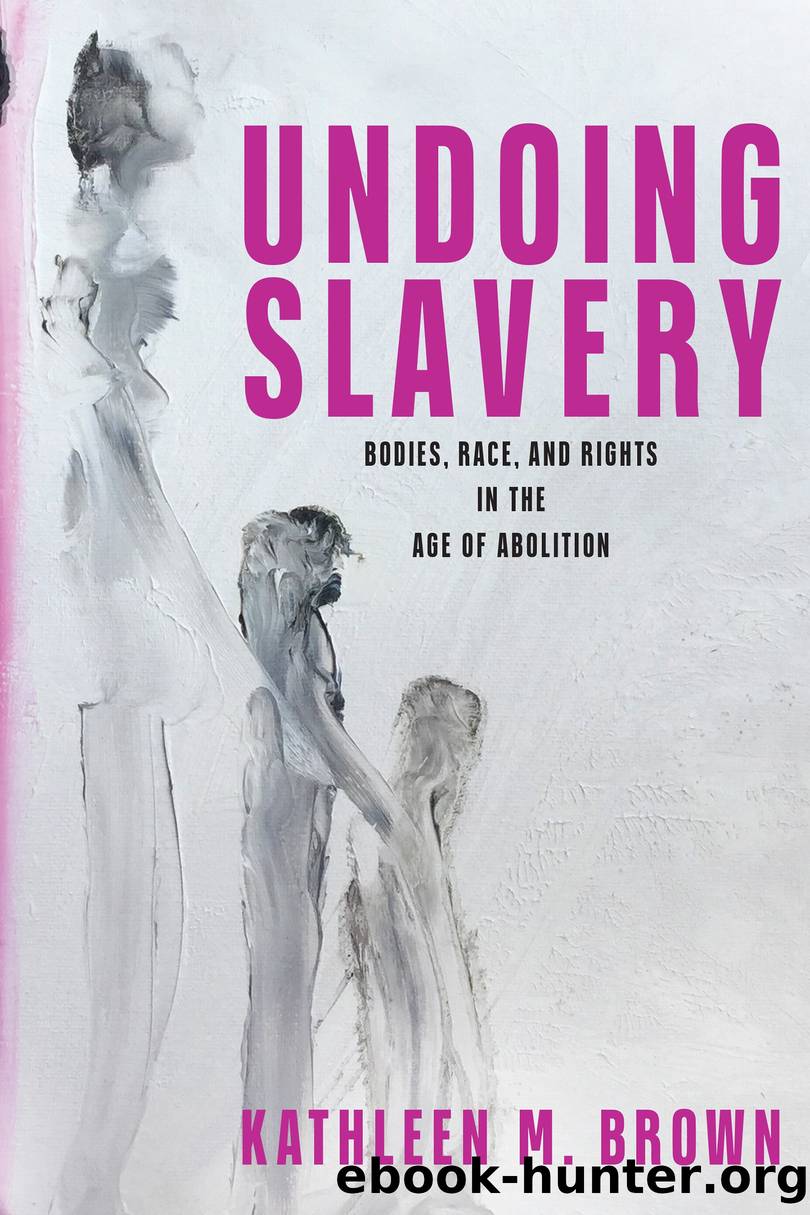Undoing Slavery by Kathleen M. Brown

Author:Kathleen M. Brown
Language: eng
Format: epub
Publisher: University of Pennsylvania Press, Inc.
An Enslaved Motherâs Song
For most of her career as an abolitionist speaker and itinerant minister, Sojourner Truth made motherhood a key feature of how slavery robbed her of her personhood. Not without reason. Alone among abolitionists, Truth was both the child of an enslaved woman and herself an enslaved mother. We can see both risk and calculation in Truthâs carefully cultivated public image as a respectable and virtuous woman. Contemplating Truthâs scrupulous grooming of that image, her reputation for speaking candidly is even more amazing, even if, with Nell Painter, we conclude that the speech in which she repeated a rhetorical question, âAinât I a woman?,â was possibly apocryphal.100
Not all of Truthâs public performances were as subject to appropriation and repackaging as her âAinât I a Womanâ speech. One well-documented occasion, her attendance at the inaugural meeting of the Pennsylvania Progressive Friends on May 22, 1853, offers a glimpse of Truthâs own carefully chosen performance of motherhood. The Progressive Friends had split off from the main body of Quakers in Philadelphia over continued activism against slavery, including their participation in the Underground Railroad. Truth had been in Philadelphia in the months before the meeting, spending time with William Still, Lucretia Mott, and other abolitionists. She had spoken to a PFAS meeting twice, in January and May, with the second appearance coming just days before the Progressive Friends gathered at the Old Kennett Meetinghouse. Addressing PFAS in the ethnoracial language of the day, she appealed to the Anglo-Saxon race to work on behalf of the oppressed African, a necessary capitulation to the contemporary usage that reflected the overlapping meanings of race, nation, and lineage.101
The hymn Truth chose for the Progressive Friends Meeting was in many ways typical of the repertoire of abolitionist music. âO Pity the Slave Motherâ was a well-known song published in the Oberlin Social and Sabbath School hymnbook in 1846. William Wells Brown included it two years later in his compendium of abolitionist hymns, The Anti-slavery Harp.102 The enslaved mother Truth invoked in song had a flesh and blood presence in her childâs life despite describing herself as kinless:
I Pity the slave-mother, careworn and weary,
Who sighs as she presses her babe to her breast;
I lament her sad fate, all so hopeless and weary,
I lament for her woes and her wrongs unredressed:
O who can imagine her heartâs deep emotion,
As she thinks of her children about to be sold;
You may picture the bounds of the rock-girdled ocean
But the grief of that mother can never be known!
The mildew of slavery has blighted each blossom,
That ever has bloomed in her path-way below;
It has froze every fountain that gushed in her bosom,
And chilled her heartâs verdure with pitiless woe;
Her parents, her kindred, all crushed by oppression;
Her husband still doomed in its desert to stay;
No arm to protect from the tyrants aggressionâ
She must weep as she treads on her desolate way.
O, slave mother, hope! seeâthe nation is shaking!
The arm of the Lord is awake to thy wrong!
The slave-holderâs heart now with terror is quaking,
Salvation
Download
This site does not store any files on its server. We only index and link to content provided by other sites. Please contact the content providers to delete copyright contents if any and email us, we'll remove relevant links or contents immediately.
| Africa | Americas |
| Arctic & Antarctica | Asia |
| Australia & Oceania | Europe |
| Middle East | Russia |
| United States | World |
| Ancient Civilizations | Military |
| Historical Study & Educational Resources |
Cat's cradle by Kurt Vonnegut(15326)
Pimp by Iceberg Slim(14477)
4 3 2 1: A Novel by Paul Auster(12363)
Underground: A Human History of the Worlds Beneath Our Feet by Will Hunt(12082)
The Radium Girls by Kate Moore(12012)
Wiseguy by Nicholas Pileggi(5766)
The Fire Next Time by James Baldwin(5424)
Perfect Rhythm by Jae(5395)
American History Stories, Volume III (Yesterday's Classics) by Pratt Mara L(5293)
Paper Towns by Green John(5174)
Pale Blue Dot by Carl Sagan(4994)
A Higher Loyalty: Truth, Lies, and Leadership by James Comey(4946)
The Mayflower and the Pilgrims' New World by Nathaniel Philbrick(4486)
The Doomsday Machine by Daniel Ellsberg(4481)
Killers of the Flower Moon: The Osage Murders and the Birth of the FBI by David Grann(4435)
The Sympathizer by Viet Thanh Nguyen(4382)
Too Much and Not the Mood by Durga Chew-Bose(4333)
The Borden Murders by Sarah Miller(4303)
Sticky Fingers by Joe Hagan(4186)
